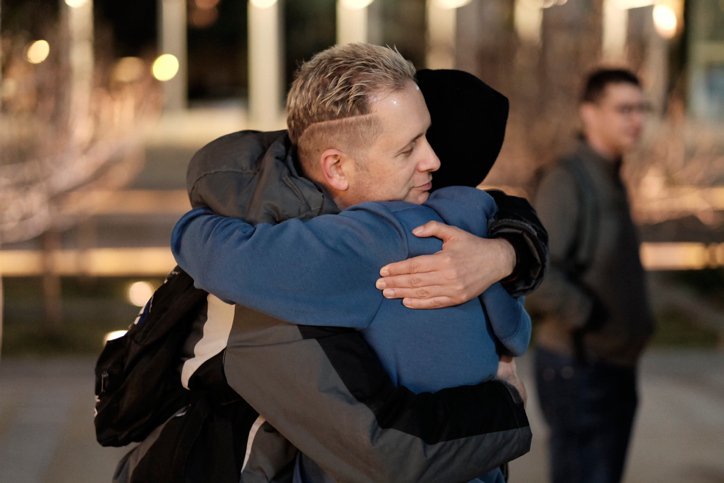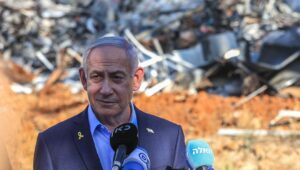In the Torah portion “Vayishlach” we consider Genesis 32-33.
Jacob’s journey and struggle
Jacob’s journey now comes full circle. He is on his way back to the land of Canaan, but is terrified to meet his brother Esau from whom he fled so many years ago after cheating him out of the birthright.
First he sends messengers to “feel out” Esau, to get the pulse of his estranged, rival brother – almost like a military reconnaissance unit just before a battle. The messengers report back to Jacob:
“We have come to your brother Esau, and he also goes to meet you; and four hundred men are with him” (Genesis 32:7).
Jacob is very, very stressed and acts accordingly. First he divides his four wives and many children plus servants into two groups. He says:
“Too many eggs in one basket. I’ll put part of the family here and part there. That way if anything happens to some of us, perhaps the rest will survive.”
Then he sends Esau gifts as compensation – to soften Esau’s heart. Lastly he prepares his wives and children for a state of war. Notice the order in which he places his wives. It shows us the discrimination within Jacob’s family, discrimination that he creates. First he sends Zilpa and Bilha, the two wives who were handmaidens to Leah and Rachel, with their children. After them he puts his wife Leah along with her children. Then, last he puts his beloved wife Rachel along with his favorite son Joseph, to protect them most of all. In Hebrew we say, “The last, last is the favorite.” (“Acharon Acharon Chaviv.”)
And what in the world was Jacob told that this is how he behaves? All in all, he was told that his brother was coming to meet him with four hundred men. But Jacob is not exactly rational at the moment. This is what can happen to us when we are wounded, and in a place of guilt, fear and stress facing the unknown.
Jacob hears that Esau is coming with a large army, with 400 men to fight him. Fear has been in his heart for more than twenty years. And everything he has achieved during these years (and he has achieved a lot… He has started a large family… He has accumulated possessions… He has gained status), all this at the moment is as nothing, as if gone in an instant.
Jacob’s interpretation of Esau’s deeds stems from the story he has been telling himself for many years. It is a story that does not include listening nor “embracing” the other, nor meeting the other halfway.
When we are in such a mood, without listening and without being willing to be OK with the other person being different – we become assertive, and our reactions come from a low emotion full of fear.
When we can let go of insisting solely on our narrative then there is room for peace and success. And Jacob has a hard struggle within himself – a fight over parting with the story he is telling himself. His turning-point-encounter happens when he is confronted with his God and himself – wrestling with the angel of God. His ability to win is a victory over clinging to his personal narrative, which he has carried like a hump on his back for many years.
In the struggle with the angel of God he also comes to terms with himself. “And Jacob was left alone.” He is left alone to fight fear and emerges victorious. And he receives a new name “Yisra’el” which by the Hebrew letters we can interpret as “Yashar & El” – Straight or upright with God. From now on, Jacob will get what he wants in the right way, without twisted manipulations and crooked ways as has done in the past. Now from a place of connection and faith.
On the other hand, what is happening with Esau, the one whom Jacob cheated, the one from whom the blessing was stolen?
Esau’s emancipation
Esau is the one who has a reason to be angry and fight. We meet him running towards Jacob.
“And Esau ran toward him…
and hugged him, and he fell on his neck and kissed him; and they wept.”
Esau is full of longing for his brother, wants to hug him, kiss him, express his feelings. Esau takes a step that allows for reconciliation, that makes it possible to set aside the wrongs of the past. It opens the heart to love and new opportunities.
Esau does all this! And he sees the abundance of Jacob’s possessions – his vast flocks and herds. We readers, too, like Jacob, are sure that now Esau’s true, vengeful face is about to be revealed, because we, the readers, also see Esau through the eyes of Jacob. We need to clean up the remnants of the fear in us. Fear makes Jacob offer part of his possessions as a gift to compensate for his wrongdoings.
And how does Esau respond?
“And Esau said, I have enough; my brother, keep what is yours.”
In other words:
“I have everything I need, I live in abundance, I am good, I am full of joy, in my heart there is love. I’m not angry. I forgave a long time ago. I have plenty my brother.
Is there any abundance that is more abounding than this attitude? To see at any given moment what we do have? Instead of seeing anger and war. Instead of being offended and fearful. Let’s recognize what we do have, with an open heart. From this place we can fill our hearts with loving feelings.
In other words, Esau says to Jacob:
“Enough of fear, enough of parting, I forgive you bro. I want to open a new page. There are much more important things in life.”
Esau knew how to take the little he received and enjoy it – the modest blessing his father Isaac gave him as compared to the blessing with which Isaac blessed Jacob. He learned to stop making the comparisons that suck us down to hellish depths. He set his painful feelings aside and turned the “have not” into a “have.” That’s where he got the strength to run and hug and rejoice at the return of his brother. He understood that it is better to earn a brother and live in peace. That’s abundance.
He realized that Jacob’s supply did not come at the expense of his. There is enough abundance for everyone.
The journey of Jacob and Esau is complete. A long and painful parting comes to an end. They both learned to meet each other more or less in the middle. They both finally learned the lesson and passed the test they had initially failed.
It is a lesson of the struggle between spirit and matter. They now have a good chance of getting back to living together as brothers, in peace.
Remember:
“I have enough; my brother, keep what is yours.”
That’s abundance.














